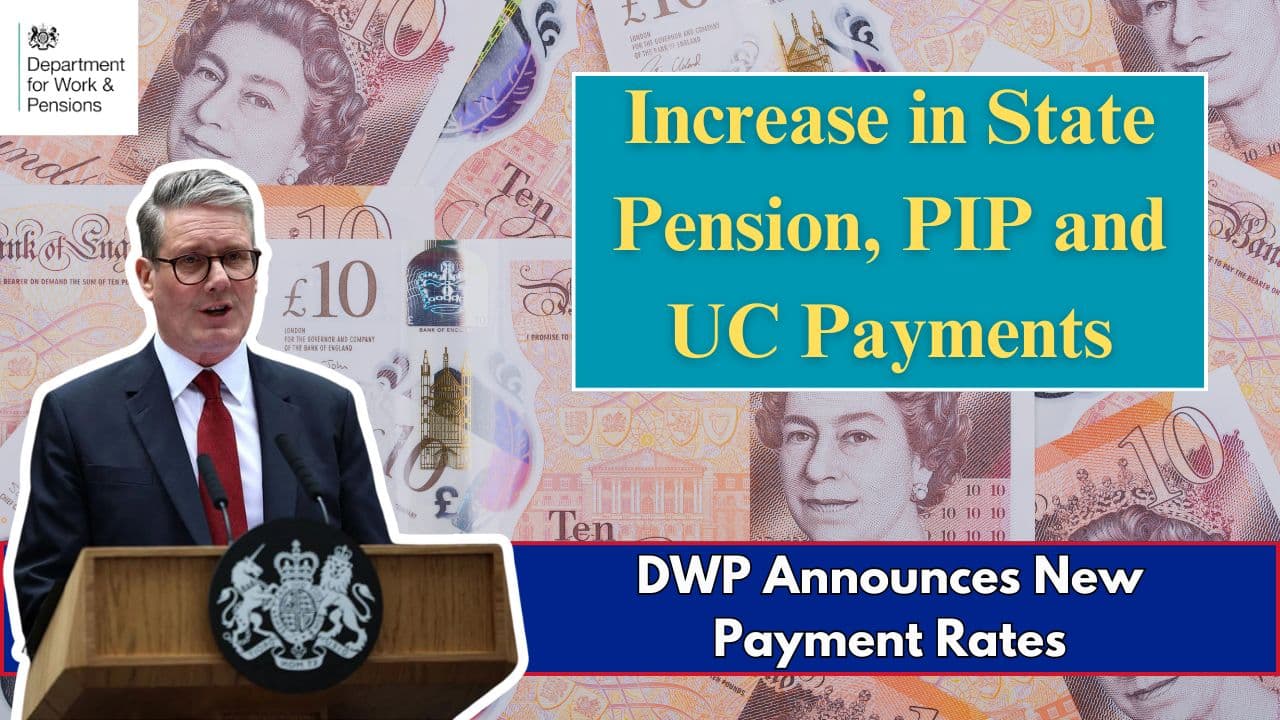The Department for Work and Pensions (DWP) is set to introduce new payment rates for various benefits, starting from April 7, 2025, for the 2025/26 financial year. These changes will impact payments like the State Pension, Universal Credit, and more, offering financial relief to millions across the UK.
This increase comes as part of the government’s effort to ensure that benefit payments keep up with the cost of living and provide much-needed support to vulnerable groups, especially in the context of ongoing economic challenges and inflationary pressures.
DWP New Payment Rates 2025
The revised rates will be a welcome change for many who rely on these payments to cover their basic needs. The new rates are designed to address rising living costs and are part of the government’s broader strategy to support citizens in need.
The financial uplift will benefit pensioners, individuals with disabilities, low-income families, and those seeking employment support. The increased payments will be reflected automatically in claimants’ accounts from April, so no additional action is required by most beneficiaries.
Key Highlights of the Changes
- State Pension Increase: The New and Basic State Pension will increase by 4.1% under the Triple Lock mechanism. The Triple Lock ensures that pensions rise by the highest of earnings growth, inflation, or 2.5%, helping pensioners maintain their purchasing power.
- Disability and Working-Age Benefits: Most disability and working-age benefits will increase by 1.7%, in line with the September Consumer Price Index (CPI) inflation rate. This increase aims to ensure that recipients are not left behind as prices for essential goods and services continue to rise.
- Pension Credit: Pension Credit, a benefit aimed at low-income pensioner households, will increase by 4.1%, bringing the average annual award to over £4,000. Pension Credit not only provides additional income but also opens the door to other forms of financial support, such as council tax reductions and free TV licenses for those over 75.
- Carer’s Allowance Threshold: The weekly earnings threshold for those receiving Carer’s Allowance will increase from £151 to £196. This change allows carers to earn more without losing their entitlement, recognizing the vital role that carers play in supporting loved ones with disabilities.
- Universal Credit Deductions: Deductions from Universal Credit will be reduced from 25% to 15%, which means claimants will retain more of their payments each month. This change is expected to help those who are struggling with debt, as it reduces the burden of repayments taken directly from their benefits.
Annual uprating letters will be sent to all claimants, informing them of the changes. It is advisable to keep these letters safe, as they may be used as proof of benefit entitlement for other financial support applications. Claimants are encouraged to review the changes carefully and contact the DWP if they have any questions or concerns about how the new rates will affect them.

Payment Rates Overview
The following table provides a summary of the new payment rates for the 2025/26 financial year. These figures have been estimated based on the relevant uprating figure and the UK Government’s rounding policy. All figures are weekly rates unless otherwise specified. The adjustments aim to provide additional financial support to those in need and reflect the government’s commitment to addressing the financial challenges faced by many households.
| Benefit | New Rate (2025) | Previous Rate |
|---|---|---|
| Attendance Allowance (Higher) | £110.40 | £108.55 |
| Attendance Allowance (Lower) | £73.90 | £72.65 |
| Carer’s Allowance | £83.30 | £81.90 |
| Child Benefit (Eldest/Only Child) | £26.05 | £25.60 |
| Disability Living Allowance – Care Component (Highest) | £110.40 | £108.55 |
| Pension Credit (Single) | £227.10 | £218.15 |
| State Pension (New, Full Rate) | £230.25 | £221.20 |
| Universal Credit (Single, Over 25) | £400.14 (monthly) | £393.45 |
Detailed List of Payment Increases
The following sections provide a more detailed breakdown of the benefit increases, highlighting specific changes that will affect different groups of claimants. The changes are intended to provide targeted support to help with the rising costs of living and ensure that those most in need receive the financial assistance they require.
State Pension
- New State Pension (Full Rate): Increased to £230.25 from £221.20. This increase will benefit those who have reached the qualifying retirement age and have sufficient National Insurance contributions.
- Old/Basic State Pension:
- Category A or B: £176.45 (from £169.50). This applies to those who reached State Pension age before April 2016 and receive the basic State Pension.
- Category C or D (Non-Contributory): £103.30 (from £101.55). This category includes individuals who receive a pension based on their spouse or civil partner’s National Insurance contributions.
Personal Independence Payment (PIP)
Personal Independence Payment (PIP) is designed to help with the extra costs associated with long-term ill-health or disability. The following increases will come into effect:
- Daily Living Component:
- Enhanced: £110.40 (from £108.55). This component is intended for those who need significant help with daily living activities.
- Standard: £73.90 (from £72.65). This is for individuals who require some help with daily living.
- Mobility Component:
- Enhanced: £77.05 (from £75.75). This payment helps individuals who have severe mobility needs.
- Standard: £29.20 (from £28.70). This rate applies to those with moderate mobility needs.
Universal Credit (Monthly Rates)
Universal Credit is a means-tested benefit that supports people of working age who are on a low income or out of work. The new monthly rates are as follows:
- Single Claimants:
- Under 25: £316.93 (from £311.63). This increase helps younger claimants who may be facing financial difficulties.
- 25 or Over: £400.14 (from £393.45). The higher rate for older claimants recognizes the increased living costs that may come with age.
- Couples:
- Both Under 25: £497.39 (from £489.23). This support is aimed at young couples starting their lives together on a low income.
- One or Both 25 or Over: £628.10 (from £617.60). This rate reflects the higher costs often faced by older couples, particularly those with children or other dependents.





